Key takeaways:
- Hospital ministry roles require balancing spiritual guidance with practical support, highlighting the importance of being present for patients.
- Setting boundaries and prioritizing self-care is crucial for maintaining effectiveness in volunteer work without experiencing burnout.
- Effective time management strategies, such as realistic goal-setting and prioritization, enhance the ability to engage meaningfully in both work and volunteer commitments.
- Celebrating small victories and continuous learning helps sustain long-term commitment and passion in volunteer roles.
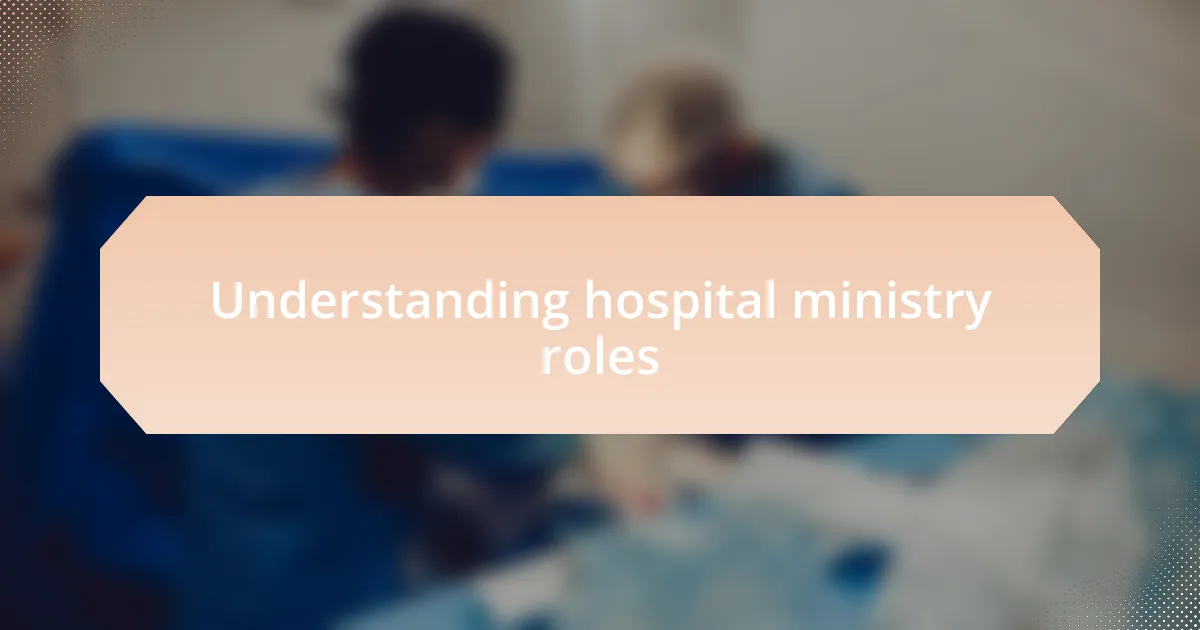
Understanding hospital ministry roles
Hospital ministry roles are diverse, often requiring individuals to navigate between spiritual guidance and practical support. I remember the first time I stepped into a hospital room to offer comfort to a patient; I felt both excitement and apprehension. How do you connect with someone facing such vulnerability? It was in that moment I realized that simply being present can be profoundly healing.
In these roles, volunteers often find themselves acting as a bridge between patients and the medical staff, facilitating communication and understanding. One time, I witnessed a chaplain facilitate a conversation that eased a family’s fears. It struck me how important it is to encourage a sense of hope in such difficult environments. Have you ever considered how a few kind words can sometimes be more comforting than medical jargon?
The emotional landscapes within hospitals can shift dramatically, and those involved in ministry must be adept at reading these changes. It’s not uncommon to encounter moments of joy and despair in the same day. Reflecting on my experiences, I’ve learned that being sensitive to these fluctuations necessitates a kind of resilience; how can we support others if we don’t first acknowledge our own emotional responses? Engaging with patients and families in this way not only enriches their experience but also shapes our understanding of compassion.
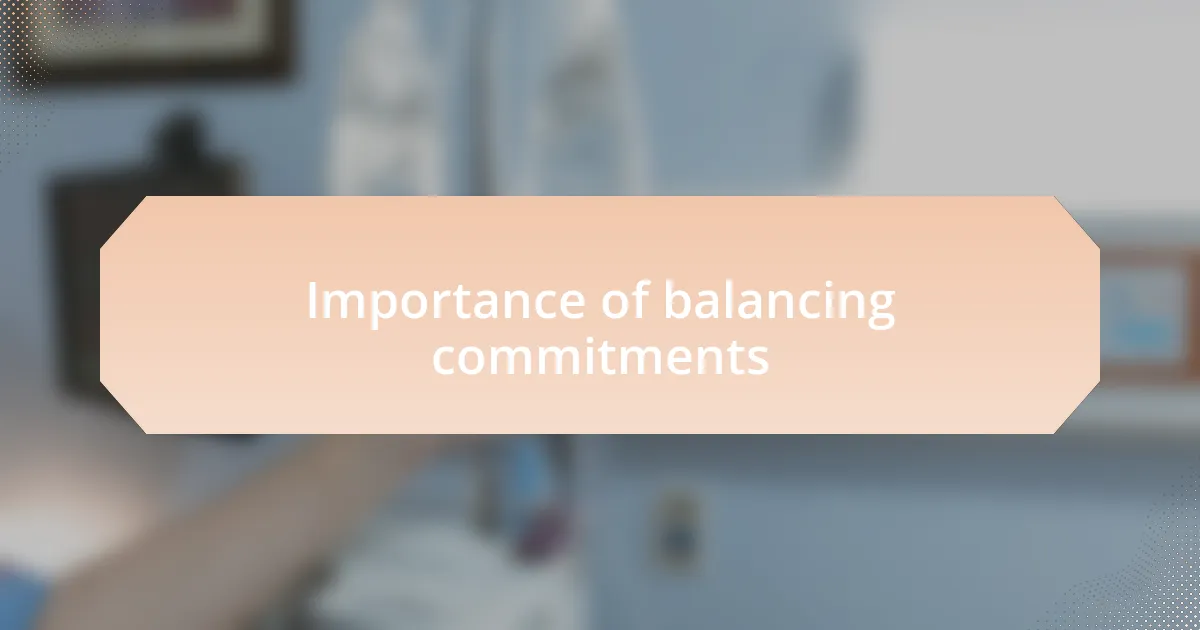
Importance of balancing commitments
Balancing commitments is crucial for sustaining energy and passion in hospital ministry. I’ve found that when I overcommit, my ability to be present with those I serve diminishes. It makes me wonder, how can we provide comfort to others if we are stretched too thin ourselves?
I’ve learned that setting boundaries is key to maintaining this balance. One time, I faced a choice between taking on an extra volunteer shift or spending time with my family. Choosing family rejuvenated my spirit and ultimately made me more effective in my ministry. This experience highlighted for me the importance of self-care; nurturing our own well-being allows us to better nurture others.
Moreover, balancing work and volunteer commitments fosters a sense of fulfillment and purpose. I remember a day when I had managed my schedule well, allowing me to fully engage during my volunteer shift. The palpable sense of connection I felt that day reinforced my belief that our capacity to give is directly linked to how well we manage our lives. How often do we reflect on the reciprocity of giving and receiving in our commitments?
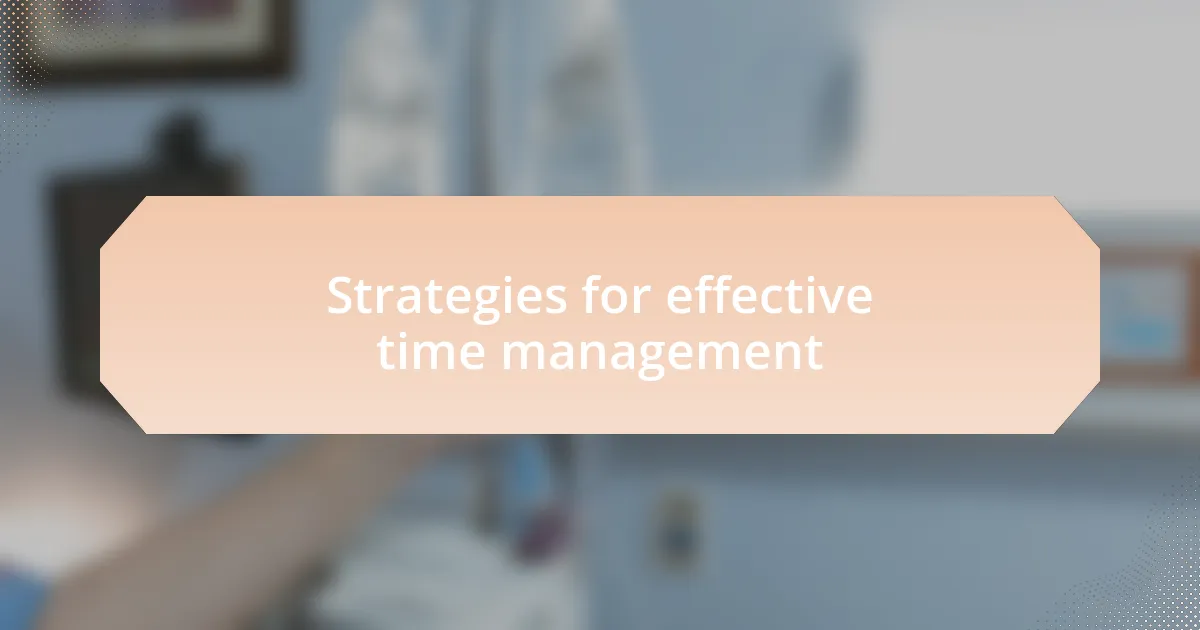
Strategies for effective time management
To effectively manage time, prioritization is essential. I often create a weekly planner that highlights my volunteer commitments alongside my work responsibilities. By ranking tasks based on urgency and importance, I find that I can focus on what truly matters each week, allowing space for both work and meaningful volunteer experiences.
I also advocate for setting realistic goals. There have been times when I’ve overestimated my available time, only to feel overwhelmed. Imagine the disappointment when I had to cancel a volunteering opportunity because I hadn’t planned my workload adequately. Learning to say no when my plate is full has been a game-changer, helping me to keep my commitments both manageable and rewarding.
Another strategy that has worked wonders for me is carving out specific time blocks for different activities. For instance, I dedicate my Saturday mornings to hospital ministry preparation, ensuring that I am mentally and emotionally ready. This routine has helped me create a rhythm, making me feel less scattered and more in control. Ask yourself: What routines can you establish that allow for both self-care and community service? Embracing this structure can make a significant difference in our ability to contribute without feeling drained.
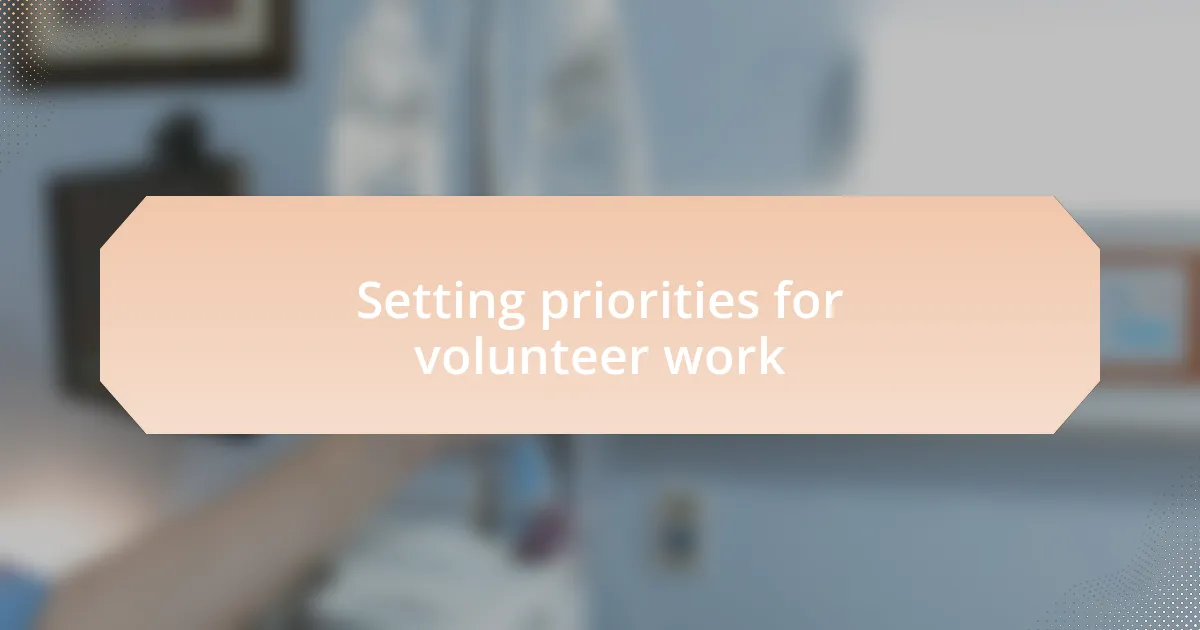
Setting priorities for volunteer work
When it comes to setting priorities for volunteer work, I believe clarity is essential. I often reflect on my motivations for volunteering and what truly resonates with my values. Recently, I had to choose between two causes I deeply care about; it was challenging. However, I realized that the one aligning closely with my skills and passions would allow me to make a more significant impact. Have you ever found yourself at a similar crossroads?
Another aspect I consider is the potential impact of my volunteer efforts. It’s important to think about where my contribution could create the most positive change. One weekend, I decided to focus on a hospital project that directly benefited patients rather than spreading myself thin across several smaller tasks. That focused effort felt immensely fulfilling and reminded me of why I volunteer in the first place: to make a real difference in someone’s life. How can you evaluate the impact of your time spent volunteering?
Lastly, I often align my volunteer commitments with my personal schedule. I know my energy levels and when I’m most productive, so I aim to choose times that suit my lifestyle. For example, I reserve evenings for calls and meetings, while weekends are dedicated to hands-on activities. Balancing these priorities not only reduces stress but also enhances my overall satisfaction. What strategies do you use to harmonize your schedule with your volunteer activities?
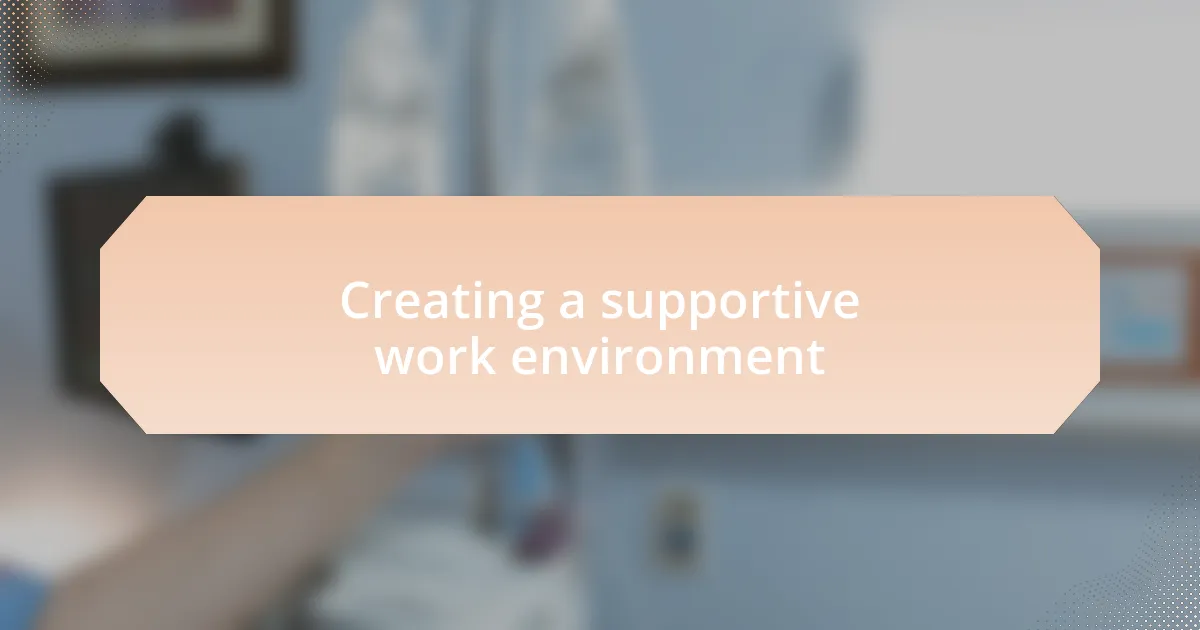
Creating a supportive work environment
Creating a supportive work environment starts with open communication. I remember a time when I had a heartfelt conversation with my manager about my volunteer commitments. Sharing my passion for hospital ministry not only helped him understand my time constraints but also opened doors for flexible scheduling. Have you had a moment where sharing your commitments made a difference?
Another key element is fostering a culture of empathy among colleagues. In one of my previous jobs, I initiated a monthly “wellness check-in” where team members could casually discuss their personal or volunteer initiatives. This small gesture transformed our workplace dynamics, making everyone more supportive and aware of each other’s commitments. How can simple practices reshape your work environment into a supportive community?
Lastly, recognizing and celebrating the contributions of team members can significantly enhance morale. I often take it upon myself to acknowledge my colleagues’ volunteer work during team meetings. This simple act reminded us all of the value we bring to both our jobs and our communities. Have you found ways to uplift those around you in your workplace?

Personal experiences in hospital ministry
During my time in hospital ministry, I faced moments that challenged my emotional resilience. One day, while volunteering at the bedside of a patient who was frightened and alone, I realized how profoundly connected we can become through our shared humanity. It was a simple act of holding their hand that brought comfort, yet it also left me reflecting on how these interactions deepen our understanding of life’s fragility. Have you ever experienced that powerful shift in perspective while helping someone in need?
In balancing my volunteer commitments with my work life, I discovered the importance of setting boundaries. There was a period when I overcommitted to both my job and ministry, which ultimately led to burnout. I learned that prioritizing self-care was essential—scheduling downtime between my shifts allowed me to recharge and show up fully for both my vocation and my ministry. Have you ever found yourself stretched too thin, and what did you do to regain your balance?
One memorable experience involved a group project where we organized a fundraising event for the hospital’s wellness program. Seeing the impact our efforts had on patient care was incredibly motivating. It reminded me that when we intertwine our professional and volunteer efforts, we create meaningful change together. Have you ever collaborated with colleagues on a project that left a lasting impression?
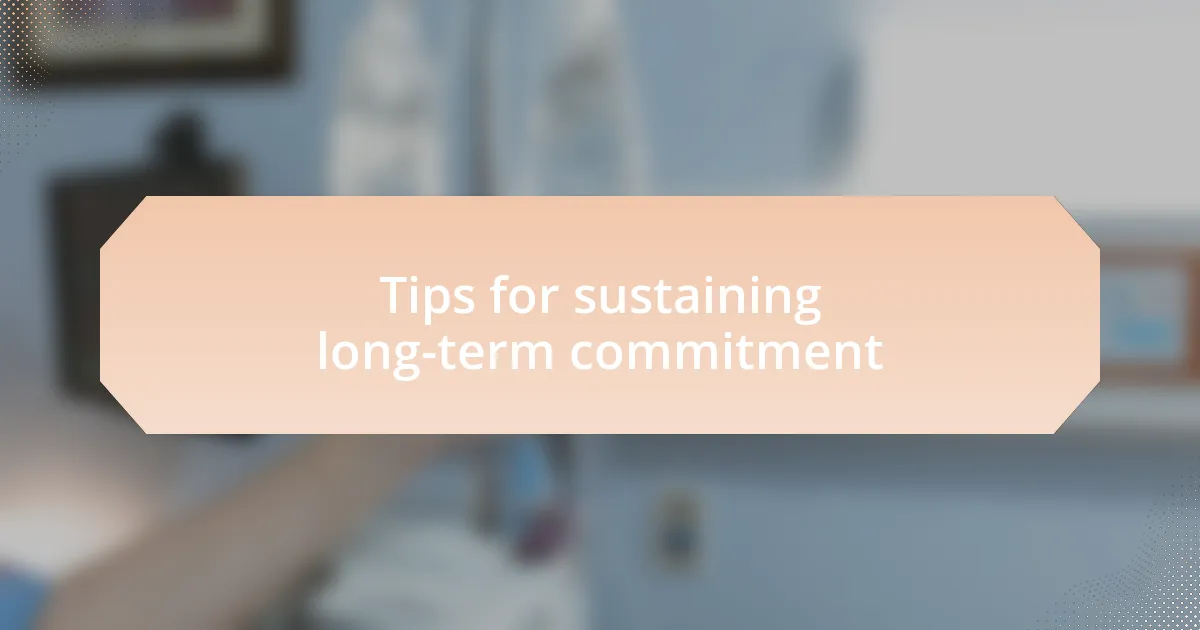
Tips for sustaining long-term commitment
One effective strategy for sustaining long-term commitment is to celebrate small victories along the way. I remember organizing monthly check-ins with fellow volunteers where we shared our challenges and triumphs. These gatherings not only fostered a sense of community but also reminded me of the meaningful impact we were making, fueling our motivation to continue. Have you ever felt reinvigorated by simply reflecting on your progress with others?
Another key to maintaining commitment is to keep your goals realistic. In my experience, I found that setting small, achievable targets helped me avoid overwhelming feelings. For example, instead of committing to every opportunity that came my way, I chose to focus on one project at a time that resonated with me. This approach not only prevented burnout but also ensured that I poured my energy into what truly mattered. How do you prioritize your commitments to prevent feeling stretched too thin?
Lastly, I discovered the importance of continuous learning in my volunteer role. Engaging in training sessions and workshops allowed me to grow, which in turn sparked new enthusiasm for my work. There was a workshop focused on emotional resilience that changed my perspective—understanding this concept enabled me to approach challenges with a fresh mindset. Have you ever experienced a moment that reignited your passion through education?